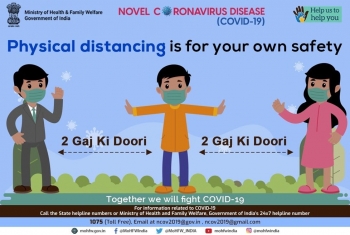
.png) Aarti
Aarti
.jpg)
Merely paying heed to what Prime Minster Narendra Modi tried to convey in his latest address to the nation this October 20 is not just sufficient. It is every citizen’s responsibility to act responsibly to ensure that the dreaded novel coronavirus - COVID-19 does not spread any further.
Adopting preventive measures assume special significance considering onset of the festive season across the country and elections in Bihar.
Notwithstanding that several pharmacological studies and even vaccine trials are underway, the COVID-19 pandemic continues to baffle the scientific community.
It has sickened and killed millions of people.
Now, where does the world stand?
There are no easy answers.
Yes, news about the novel coronavirus seems to be still evolving and the number of people infected by the dreaded disease continues to change almost on a daily basis the world over and India is no exception.
Debates about COVID-19 never seem to conclude. The disease primarily started in animals and spread to human beings after an initial outbreak last December amongst people associated with seafood and live animal markets in Wuhan, China.
In the next month, cases of a mysterious pneumonia surfaced in Wuhan and the weeks that followed, person-to-person spread of the virus was identified around the globe.
With the virus putting the whole world in a dizzy, the World Health Organization (WHO) declared COVID-19 a pandemic in early March.
How does the virus which reportedly was found to measure 60 nm to 140 nm in size travel through the air and spread infection?
The moment a person breathes or talks, sneezes or coughs, a fine spray of liquid particles takes flight. Some are large, visible and referred to as droplets while others are microscopic and categorized as aerosols.
COVID-19 hitch rides on these particles with their size dictating their behaviour. Droplets can shoot through the air and land on a nearby person’s eyes, nose or mouth to cause infection. Studies have shown that an average person touches one’s face about 16 to 24 times an hour.
Compared to many nations, India had been quick enough to clamp down one of the world’s harshest and longest lockdowns soon after Mr Modi addressed the nation on March 24. When he made the first announcement of a complete lockdown across the country for 21 days, his fervent appeal to the general public was not to cross the 'lakshman rekha' of their homes in the next three weeks.
In the seven months that have since passed, at every available opportunity, Mr Modi emphasised, through various platforms including social media on the need to take necessary precautions so as to keep COVID-19 at bay.
Notably, in his Mann ki Baat programme on July 26, Mr Modi not only urged people to remain cautious and take all precautions, but reminded everyone that the coronavirus continued to remain as dangerous as it was in the beginning. Stating that he noticed that many people take off their masks when they are needed the most, like when they have to talk to others, he advocated maintaining social distancing besides regular hand washing and wearing of facial masks.
On the occasion of his birthday in September, Mr Modi tweeted “Since many have asked, what is it that I want for my birthday, here is what I seek right now: Keep wearing a mask and wear it properly. Follow social distancing. Remember ‘Do Gaj Ki Doori.’ Avoid crowded spaces. Improve your immunity. Let us make our planet healthy”.
Although public health efforts have been aimed at "flattening the curve” which in simple terms means that there would be fewer patients during that period and hospitals would be better able to manage the demands of patients who are sick with COVID-19 and other illnesses.
But until an effective vaccine against COVID-19 is available, there is an imperative need to keep ourselves safe and healthy.
It needs to be appreciated that life has to go on amidst COVID-19 and prevention is the only cure. If things go wrong, it is basically due to negligence and flouting of precautionary measures with impunity.
Thus, today, simply put, preventing COVID-19 is all about hand washing, keeping a safe distance from each other and quarantine.
Importantly, the most effective way to check the virus is the wearing of masks which is now the new normal. Its prices have been capped and made affordable apart from free distribution to the poor and needy.
So, if everyone in the community uses a face mask, it can reduce transmission of the virus. Although not wearing a face mask in public places has been made a punishable offence across nations, if many continue to flout, it only depicts a mark of irresponsibility.
It is only by avoiding adverse events, the public at large can contribute immensely by keeping COVID-19 at bay.